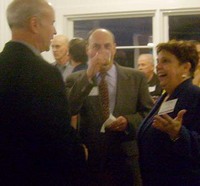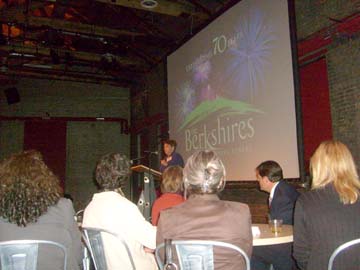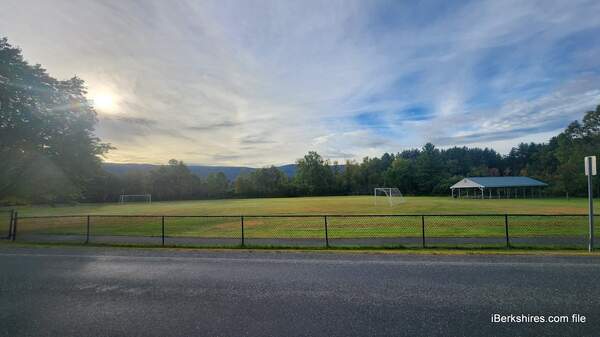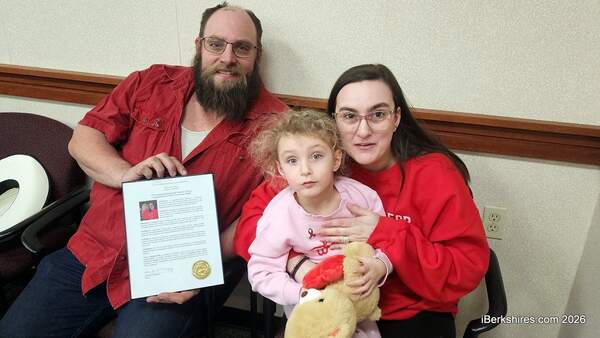
Visitors Bureau Urges County to Work Together
 |
| BVB head Lauri Klefos, right, welcomes bureau members.View Slide Show |
But it will take the continued collaboration of the region's communities, nonprofit organizations, political leaders and businesses to keep the tourist dollars flowing, especially in light of the recent loss of state funding to the tune of $750,000.
"It's about putting all our oars in the water at the same time and paddling in the same direction," Ray Smith, vice president of the Berkshire Visitors Bureau, told the assembled members at the agency's 70th annual meeting on Tuesday night at Massachusetts Museum of Contemporary Art.
It was a sentiment echoed by outgoing Chairman Brian Butterworth of the Red Lion Inn and his successor, Ellen Spear of Hancock Shaker Village, who invited a broader range of the economic community to become more involved in the region's creative economy.
"I know Lauri [Klefos] talks about destination marketing, but it should be more than a mantra," said Spear. "Destination marketing says Berkshire County is a good place to visit, and a good place to visit is a good place to live and a good place to put your business."
And there's good reason for optimism: Spending and visitors were up overall this past year despite a slow, rainy start in early summer and soaring gas prices. And over the past year, the bureau has reinvented itself to a degree, with a new president (Lauri Klefos), a new slogan (Nature, Culture, Harmony), a new logo, and revamped Web site. It's wiped out a $57,000 deficit to end the fiscal year with a slight surplus.
 Spending in the county has continued to rise, up $36 million from 2004 to a total of $319.4 million in 2006 (the latest year available); participating members payrolls were up a $1 million in 2006.
Spending in the county has continued to rise, up $36 million from 2004 to a total of $319.4 million in 2006 (the latest year available); participating members payrolls were up a $1 million in 2006.The median household income of visitors is just over $100,000, the median age is 52.
The coming year's objectives, said Klefos, will be to continue cooperation, strengthen the Berkshires brand, better use Web technology and aggressively advertise in key locations, particularly promoting the region's "shoulder seasons."
"We have to make sure everyone knows we are a four-season destination," said Klefos to loud applause.
To promote those four season, the bureau is focusing on four themes — harvest (fall), comfort (winter), preservation (spring) and arts and culture (summer). It is heavily advertising in four driving-distance markets — Boston, New York City, Hartford, Conn., and Albany, N.Y., including in major online media asking those readers to "embrace the moment" and head for the Berkshires.
The online marketing is designed to catch casual browsers, said Klefos. "People are making [trip] decisions at the last minute."
In fact, the online component has become a significant part of the bureau's branding and proactive approach to engaging returning or potential tourists. The new Web site includes webisodes created in house of seasonal attractions; a "Berkantile" shop to promote regional branding; blogs about area events and venues; Web cams, guides and links.
The site had nearly a million hits and 43 percent of those visitors were unique, or new, to the site. And they stayed there for awhile, said Smith. "It's a sticky site."
Klefos said the bureau also will be more proactive in pitching stories to regional media around the angles of nature, culture and harmony.
But despite the general optimism at Tuesday's meeting, there could be tougher times ahead, especially if the economy continues to tank.
In a letter to bureau members on Wednesday, Klefos warned "there is no doubt that we are in for some turbulent times."
The state's Office of Travel and Tourism wasn't immune to Gov. Deval Patrick's $1.4 billion budget cuts several weeks ago. That means $750,000 less for Berkshire County, which will affect infrastructure and advertising plans. More cuts may be on the way and there is no way to gauge how the downturn will affect tourism.
Klefos wrote the bureau would spend what it has wisely and urged members to help it "think out of the box."
"In talking with members [on Tuesday], I was struck with the feeling that during crises there is a chance for innovative ideas to emerge, new directions to be taken, and alliances to be forged," wrote Klefos.
One bright spot may be the opening of the three-floor Sol LeWitt exhibition at Mass MoCA. Bureau members got a sneak preview of a dozen works in the retrospective of the late artist on Tuesday.
Museum Executive Director Joseph C. Thompson said 65 artists have been working over the past six months to create the geometric works on an acre of wall space. "It encompasses the entire career of Sol LeWitt," he said.
The highly anticipated, "temporary," 25-year exhibit opens Nov. 16.
In the meantime, Spear urged businesses and nonprofits alike to recognize the bureau and its members as an important resource and reminded them, as Darwin said, they have collaborate and adapt to survive.
"Edith Wharton said there are two ways of spreading light — to be a candle or the mirror that reflects it," said Spear. "I'm hopeful in the months ahead that the [bureau] will be the mirror reflecting the light each of your businesses shed ... and together that light will light the way to make all our business in Berkshire County more successful through the year ahead."
The 70th annual meeting was sponsored by Mass MoCA and Tanglewood, with support by Lickety Split, Prime Outlets in Lee and Cafe Latino.















